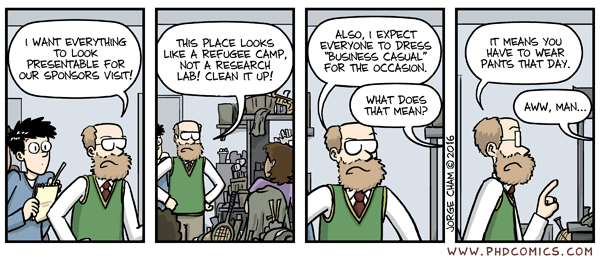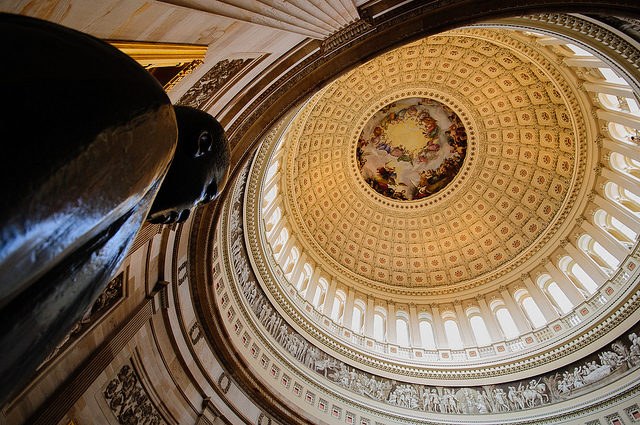AKA. What does ‘Business Casual’ actually mean anyway?

Reposted with permission from PhD Comics -3/7/2016
As conference season is fast approaching, here are some tips to help you answer the age-old question, “What am I supposed to wear?” This post came out of a clothing crisis I had when faced with the ambiguous directive to dress in “business casual” for an important meeting. I wanted to appear put-together but not over-dressed, and also to be comfortable (after all, there really isn’t a professional way to take your shoes off because your feet hurt!). So, I turned to the internet and a few trusted friends and here’s what we came up with.
Part of the reason why ‘business casual’ is so hard to pin down is because the standards for what is appropriate largely depend on the workplace or organization. Also, social norms around clothing change over time so advice can often be conflicting. For example, many older sources I consulted stated that skirts should be knee length or longer, while a number of newer sources advised no more than 3 inches above the knee! Opinions were also divided on if it is ever appropriate to rock the “business shorts” in a workplace.
A few basics we could all agree on – whatever you wear, make sure it is wrinkle-free, unstained and doesn’t have any holes or loose threads. Also, people advised avoiding outfits that were very loud or flashy (e.g., head-to-toe sequins, multiple bright patterns, etc.) as they might distract from what you are saying. Part of convention is networking and if your clothes are speaking louder than you are – it might not be the right outfit for the job.
Overwhelmingly, people also thought that jackets seemed too formal, unless worn with dark jeans or khakis to dress them down slightly. For those who do wish to wear a blazer with a dress shirt or dress pants, feel free to lose the tie. One exception is if you are presenting – then err on the side of more formal dress.
One piece of advice that came up repeatedly was to wear layers. Often, you’re walking or transiting to convention in the heat, only to enter a freezing convention centre minutes later. The other piece of advice was to wear comfortable shoes. Again, many of the same things apply to footwear as to clothing – avoid shoes with holes, that are visibly scuffed or dirty, or that you would wear to exercise in. A good bet is to stick with neutral colors – navy, tan, brown, or black – as they match with many outfits so you can wear them multiple times. If you plan to do a lot of walking (and you likely will), you might consider bringing more than one pair of shoes so you can alternate if your feet get sore.
There are many more extensive guides out there and much of this will be up to your discretion, so a good rule is if you’re not sure if an item is appropriate – trust your instincts, it probably isn’t. And if you’re craving more info about what to wear to convention, check out this excellent post – Dressed by Jess – from a few years ago!


 As a student member of the APA and a psychologist in training, I’ve been disappointed in the
As a student member of the APA and a psychologist in training, I’ve been disappointed in the 